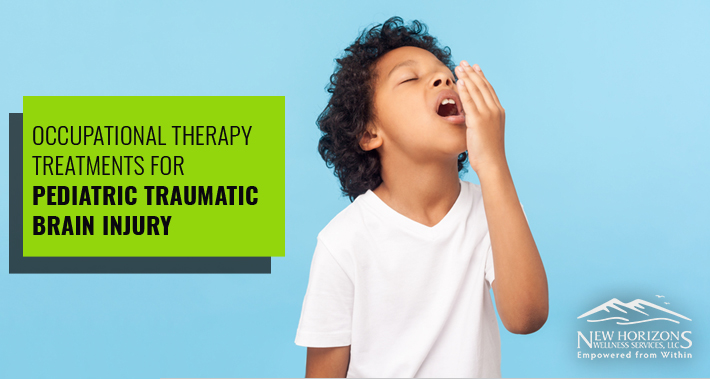
Traumatic brain injury is much more common than most people realize.
On average, a child or young person will acquire an injury which affects their brain every thirty minutes.
Because the brains of children are still developing, it can be difficult to know the extent of the damage right away – some signs and symptoms may take time to develop.
One thing you can do to help mitigate the long term damage from a brain injury, is to seek early help and intervention from an occupational therapist for children.
Keep reading to learn more about the signs and symptoms of traumatic brain injury, and how an occupational therapist can help with treatment and recovery.
What Is Traumatic Brain Injury?
Traumatic brain injury occurs as a result of a blow or jolt to the head which is sudden and violent.
It causes the brain to strike against the skull, which can result in bleeding, tearing of nerves, and bruising.
The severity of this condition varies drastically based on the nature of the injury that caused it.
Traumatic Brain Injury Symptoms
If your child has experienced an injury, and you’re worried it may be a traumatic brain injury, there are a number of signs to watch for.
These fall into two main categories – psychological and physical.
The initial stage of the traumatic brain injury may include:
- Reduced ability of blood vessels to service the brain, due to pressure
- Brain tissue damage, from the brain pressing against the skull
- Bruising behind the ears or around the eyes, indicating internal bleeding
Other signs include:
- Decreased level of consciousness, or loss of consciousness
- Seizures
- Poor coordination
- Intense headache
- Vomiting and nausea
- Pupil dilation
- Anxiety and distress
- Numbness and weakness in the extremities
- Changes to sleep patterns
- Slurred speech
- Brain fog
- Mood swings
- Tiredness
- Memory issues
- Sensitivity processing issues, especially with sound and light
- Ringing in the ears
In some cases symptoms will appear immediately, however, in others, they may take some time to develop.
If your child has experienced a head injury, monitor them closely for at least twenty four hours, for signs and symptoms.
What Causes Traumatic Brain Injury?
In general, any blow to the head can cause traumatic brain injury.
Common causes of traumatic brain injury include:
- Car crashes and other road accidents
- Physical violence
- Falls
- Gunshot wounds
- Injuries from sports
Diagnosing Traumatic Brain Injury
Following a head injury, a diagnostic tool called the Glasgow Coma Scale is used to evaluate how likely it is that a traumatic brain injury has occurred.
The scale looks at whether your child can open their eyes easily, as well as verbal and physical responses.
Points are given based on the following criteria:
Eye Opening Response
- Eyes don’t open
- Eyes open in response to painful stimuli
- Eyes open in response to verbal stimuli
- Eyes open spontaneously
Verbal Response
- No verbal response
- Makes sounds which are incomprehensible
- Inappropriate or nonsensical speech
- Confused speech, but can answer basic questions
- Normal communication
Physical Response
- No movement or response
- Pain response – extension of the arm
- Pain response – flexes arm
- Moves away from painful stimuli
- Can indicate where they feel pain on the body
- Response to commands to move
What It Means
A score under eight will be classified as a coma, nine to twelve as moderate brain injury and minor if over thirteen.
Other diagnostic tools such as CT scans or MRIs can help determine the location and extent of the damage.

How Can Occupational Therapy Treatments For Traumatic Brain Injury Help?
If your child has suffered a traumatic brain injury, an occupational therapist will play an important role in their treatment plan.
Let’s have a look at some of the ways an occupational therapist can help.
1. Helping Your Child Perform Activities Of Daily Living
There are a number of tasks most people can do without thinking too much about it.
For kids, these can include things like playing, eating and drinking, tying their shoes, or getting dressed.
When someone has a traumatic brain injury, things which used to be easy may now require a great amount of mental effort – an occupational therapist can help someone to relearn these tasks.
For especially young children, this may involve teaching them skills for the first time, like potty training or other activities that involve their fine motor skills.
2. Improving Concentration
If your child has had a traumatic brain injury, they may seem to be distracted or lose their ability to focus on things.
An occupational therapist can work with your child to help improve their attention span and develop strategies to help with the memory loss which can occur alongside brain injuries.
3. Improving Emotional Health
People who have experienced brain injury may suffer from poor emotional health, especially if they feel unable to do the things they used to do.
An occupational therapist may introduce ways to help manage this frustration and help improve emotional health.
4. Improving Cognitive Skills
Cognitive skills can include things such as visual and auditory processing, working memory, and language and communication.
Following a traumatic brain injury, your child may experience cognitive delays, but an occupational therapist can work to provide intervention and help improve these areas.
They may also recommend a social skills meeting group or pediatric speech therapy treatments depending on the situation.
5. Regaining Independence
One of the biggest impacts on individuals with traumatic brain injury is the loss of independence.
The inability to perform basic tasks, and having to rely on others for help can be a big source of stress and anxiety.
That’s especially true for children who have just recently begun to learn the skills they need to be more independent.
An occupational therapist can help people to relearn skills, or find new ways of doing things, in order to regain independence.
Book Your Appointment With New Horizons Wellness Services Today
Has your child experienced an injury, and now you’re worried they’re showing signs it may be a traumatic brain injury?
Are they experiencing sudden changes to their motor skills or seem to have a change in cognitive ability?
Are you looking to get them assistance in being able to relearn how to do everyday tasks, and create strategies to help them be more independent going forward?
We’re New Horizons Wellness Services in Tigard Oregon, and we can help.
Book your appointment with one of our pediatric occupational therapists today.
Yours in Health,
New Horizons Wellness Services13333 SW 68th Pkwy,
Tigard, OR 97223
- https://g.page/newhws
New Horizons Wellness Services provides a true multidisciplinary approach to mental & physical health treatments for children, adults and families.
